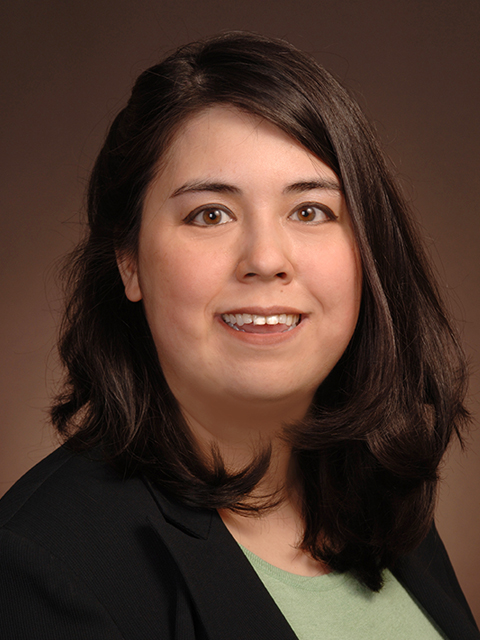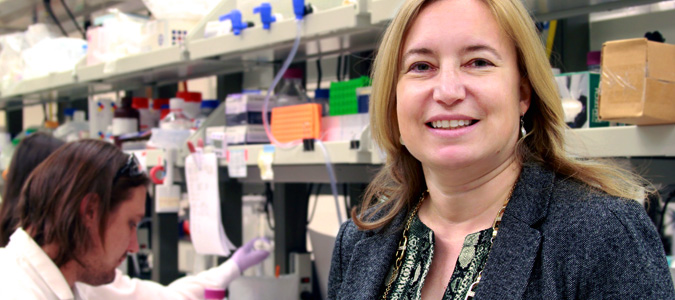Karen Anderson is an ASU scientist who sees patients struggle with cancer as she makes rounds as a Mayo Clinic oncologist.
Jennifer Blain Christen is an ASU electrical engineer pushing the boundaries of sensors and circuits to improve health care.
Together, they are combining their expertise to allow people to quickly and inexpensively check their health status.
Anderson, of the Virginia G. Piper Center for Personalized Diagnostics at Arizona State University’s Biodesign Institute, and Blain Christen (pictured at left), of the School of Electrical, Computer, and Energy Engineering in ASU’s Ira A. Fulton Schools of Engineering, are making steady progress on a $1.8 million grant from the Smart and Connected Health Division of the National Science Foundation to make their dream point-of-care technology a reality.
They will create a patch that absorbs sweat to track biological molecules that can indicate the presence of a disease or infection. In their vision, the information could be relayed to a smartphone, making an instant biomarker check easy as step counting or heart rate monitoring on a fitness tracker.
“This technology decreases the burden on health care workers and empowers a person to have a more intimate knowledge of what’s going on in their body,” said Blain Christen. “And what’s in your phone is more powerful than what we had in a big computer just 10 years ago. We don’t have to worry about computation in our patch if we can just get data to this incredible computer now found in everyone’s pockets.”
The technology Anderson and Blain Christen are developing relies on fluorescence detection, used in the biosciences to accurately measure the number of biomarkers present, including those that may predict early detection of cancer, diabetes or infection. The device also uses the latest advances in ASU’s Flexible Display Center technology to customize the fit of the patch, contouring smoothly to a person’s skin, and lowering the overall production costs by packing all of the sensor technology within the patch.
The biggest challenges the scientists have faced in refining their technology include determining which biomarkers are useful to measure in sweat, how to measure molecules present in largely different concentrations and how to make this device accessible to everyone.
“The best tests are only good tests if they can get to people,” Anderson said.
Karen Anderson is an ASU scientist who sees firsthand patient’s struggles with cancer while making rounds as a Mayo Clinic oncologist. Now, she wants to make a difference for people to quickly and inexpensively check their health status.
Anderson and Blain Christen will be using the latest grant funds to confront these challenges, iron out the details of integrating their technology with smartphones, and enhance their first prototype. They predict that the technology will be available for consumers within several years.
Collaboration was essential for establishing the feasibility of creating a point-of-care platform technology and applying for development funding. Anderson and Blain Christen both relied on the help of Ben Katchman, a postdoctoral fellow working with Anderson at the Biodesign Institute, as well as Joseph Smith, a member of the Flexible Electronics and Display Center at ASU.
As Anderson explained, “Part of the reason why I came to the Biodesign Institute, and an exciting part of what we do, is that we get to cross disciplines in ways that are very difficult to do in other institutions. This is something that makes ASU really unique.”
More Science and technology

ASU brings 'Science @ Scale' to AAAS meeting in Phoenix
When the American Association for the Advancement of Science Annual Meeting takes place this month in Phoenix, Arizona State University will be well represented.Dozens of ASU researchers — whose…

The AI tool giving teachers time back
Sarvesh Bhardwaj didn’t set out to disrupt American education. At first, he was just a parent watching his son struggle.Even in a well-resourced school district, something felt off. His older child…

Uncovering a pandemic’s ‘perfect storm’
In 2020, the COVID-19 pandemic shut down the world and claimed more than 3 million lives, creating reverberations that we still feel today.It was a catastrophic event that researchers like Nina…


